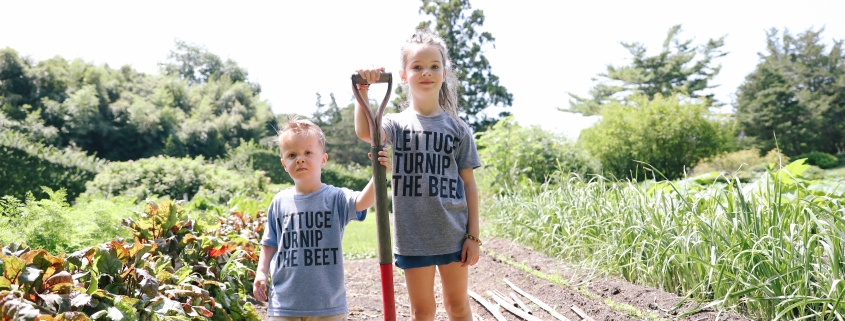How Gardening Grows Your Child’s Mind, Body, and Soul
“If you have a garden and a library, you have everything you need.”
– Cicero, Roman statesman
“Why try to explain miracles to your kids when you can just have them plant a garden?”
– Robert Brault, American author
“Let them once get in touch with nature, and a habit is formed, which will be a source of delight through life.”
– Charlotte Mason, English educator
A garden is one of the greatest gifts you can give your child. Your time is another. This summer, dig down into the dirt with your children to find countless benefits for the mind, body, and soul. Whether you have a backyard filled with raised beds, a sunny patch out front, a few patio containers, or a community garden, the advantages are all the same.
How Gardening Benefits the BRAIN
- Garden food ensures your kids get brain-boosting vitamins and minerals. According to Harvard researchers, the best foods for the brain include easy-to-grow leafy greens (kale, spinach, collards, broccoli), as well as berries (strawberries and blueberries).
- Being out in the sunshine boosts the body’s vitamin D. One study found 67% of children had insufficient levels of Vitamin D. Deficiency in this area has been linked with mood disorders, behavioral problems, and psychological difficulties that persist into adulthood. Just 10-30 minutes of sunlight a day is all your kids need!
- Soil mycobacterium reduces depression. Multiple studies found that harmless mycobacterium found in soil can double as an antidepressant by triggering the body’s natural release of serotonin. Beyond that, the feeling of self-satisfaction and accomplishment that follows harvest time is priceless for a little one’s emotional health.
- The act of gardening reduces stress. Kids stress about changing schedules, inability to complete tasks independently, limitations to their freedom, demands placed on them by school, fitting in with social peers, parental fighting, and a glut of other issues. Dutch researchers found that just 30 minutes of digging reduces the level of the body’s notorious stress hormone, cortisol. They compared the results of the gardening group to a group of readers and found that “positive mood was fully restored after gardening” — but not with reading.
- Gardening is science in action. There’s so much science happening before our eyes in the garden. Ask your kids questions like, “What three things do plants need to grow? How does the plant drink water? Why are worms good for the plants? Do you know what photosynthesis is?” Examine the parts of plants with a microscope or magnifying glass, and talk about identifying which plants are beneficial, and which can be dangerous to people.
- Math and gardening go hand-in-hand. Incorporate math concepts by measuring depth, distance between plants, and how much they’re growing each week. Add in art by taking pictures of the plants from week to week and turning it into a “plant journal” or garden scrapbook. Supplement your experience with trips to the botanical gardens. Shapes, symmetry, problem-solving – these are all concepts to be explored in your garden.
How Gardening Benefits the BODY
- Kids who garden snack healthier. One study found young gardeners exhibited a preference for choosing fruits and vegetables at snack time.
- Gardeners eat healthier as adults. Another study found that households participating in gardening ate 40 percent more fresh produce per day, and were 3.5 times more likely to achieve the recommended five servings.
- The garden builds immunity. Professor, Author, and Germ Expert Jack Gilbert says the exposure to garden microbes stimulates and strengthens young immune systems. In his 2016 study, he found Amish children who grew up on farms had asthma at half the rate of the national average.
- Gardening improves physical activity levels, as well as nutrition. After the Oklahoma Cooperative Extension Service added an after-school gardening program for grades K-8, they found the percentage of kids who ate fruit and vegetables every day increased from 21 to 56%, and the number of kids who were physically active every day increased from 51 to 79%. Gardening is one way to curb childhood obesity, as kids can burn over 300 calories an hour stooping, standing, kneeling, watering, and weeding.
- Heavy work improves motor skills. Lifting heavy watering cans or digging with a shovel gives kids the chance to demonstrate their strength, while pushing a child-sized wheelbarrow or crouching down low to plant improves balance. These activities that use the big muscles of the arms, legs, and torso hone gross motor skills –which, in turn, improves posture, strength, endurance, and coordination. Grasping a trowel or rake, as well as pinching seeds or weeds, improves fine motor skills used in writing and cutting with scissors.
How Gardening Benefits the SOUL
- Gardening breeds empathy and improves relationships. A 2017 research paper suggests that being close to nature evokes positive emotions. Outdoor activities like hiking, bird-watching, and gardening act as a tangible catalyst to happiness. Attachment to plants and animals in early childhood stimulates feelings of empathy, compassion, and connection with others. Kids (and adults) who are physically connected to their natural landscape have an increased sense of belonging, the authors indicate. Gardening as a household is a “relationship connector,” says Bonnie Lehman of Michigan State University. You’re solidifying relationships among family members with time spent together and creating loving, fond, stress-free memories.
- Planting improves self-esteem. “Gardening helps make children feel more capable,” according to Dr. Wendy Matthews, a Mindprint Learning consultant. “It is wonderful for building a child’s sense of competence, as they engage in a real life activity that they might have previously seen as only for adults.” In fact, the U.S. Department of Agriculture is spending a quarter of a million dollars to improve the self-esteem and environmental stewardship of teenagers by teaching them sustainable gardening.
- Gardening is a mindfulness activity. Our children are not immune to the anxieties and stresses of life – a life that has become more digitized than ever before. Unplugging and focusing on the gentle tasks of gardening is a wonderful exercise in mindfulness. “When you are planting, watering, weeding and harvesting your senses are fully engaged in the sights, sounds, smells, tastes and tactile sensations of your garden,” explains psychic medium James Van Praagh, adding: “Gardening gives us time to connect with something tangible and real.”
- Planting is cathartic, especially for kids with disabilities or health issues. “For patients who find themselves restricted by a disability, even the simplest gardening experience – such as growing a potted plant from a cutting – gives them a feeling of control,” Horticultural Therapist Teresia Hazen explains. She adds: “Gardening, more than most rehab activities, has the ability to be very distracting. Simply by taking people’s minds off their problems can alleviate pain and depression.”
- Teach patience, sharing, responsibility, and communication. The family time spent together in the garden gives us the ideal time to teach the crucial life lessons that make our children better people. They need to be patient to wait for their seeds to go. They need to be responsible to water and weed their plants every day. They need to share garden tools with siblings, share the workload with others in the family, and put in their own effort for the benefit of the greater good. They learn to express their frustrations, their hopes, and their feelings in the moment. When it’s all said and done, they can literally taste the fruits of their persistence and hard work.
Ready, Set, Grow!
If you’re just getting started, try these easy plants that are suitable for the most impatient toddlers or try one of our Garden Project classes that combine art, science, and nature in compelling ways. If you’ve been a green thumb for years, you may find the following research added comfort that you’re digging down the right path.



